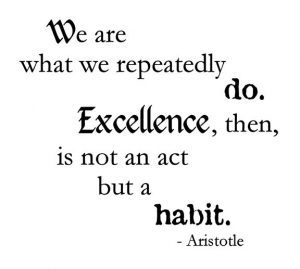My most recent imaginary visit with a younger self didn’t take me very far back in my virtual time machine—only to the summer of 2014. At that time, Not-Much-Younger-Me was in the midst of an ambitious project to visit a positive blog every day and document those travels on this site’s Random Kindness Blog Tour page.
She had in fact set herself a schedule that called for multiple self-improvement and home-improvement projects going on at the same time. The other ones included decluttering the house and writing weekly posts about it, composing a monthly Recovering from Negativity blog series in the nature of a 12-step recovery chronicle, and learning to row a double scull with hubby well enough to compete in regattas. Some might have called it a midlife crisis of sorts, though she wouldn’t have described it as such.
I caught up with her while she was standing in the backyard on a warm sunny afternoon, working on what seemed a never-ending job of cutting back all the bushes and small trees that had been damaged by that year’s frigid winter. She ought to have hired someone to take care of that chore instead, as it didn’t all get finished before winter came again; but, long ago, she had gotten in the habit of taking too much upon herself without realizing it.

I stepped into the shade of the little tree that she was pruning. She glanced over at me, blinked a couple of times, and then just shook her head in a tired-looking way.
“If you’re a new blog idea or story plot having to do with a visit from an alternate me, well, I don’t mean to be rude,” she began, in a tone that sounded like it was meant to be apologetic but conveyed very little beyond weariness, “but I have a lot going on at the moment. Maybe I can get around to writing about you next week sometime, if nothing else comes up.”
“Oh, no, I’m just here to talk a little, that’s all. No need to schedule anything,” I said cheerfully. The shade felt cool and pleasant. Somewhere in the leaves above my head, a bird gave a chirp of curiosity.
“And I certainly don’t mean to be rude either,” I went on, “but you’re kind of a newbie when it comes to this positivity stuff, so I thought it might help to talk about a few things. Such as, you’re not obligated to put on a happy face every morning and convince yourself that life gives you boundless energy, making it easy and fun to do anything you might imagine for as long as you want. The human body has natural limitations, after all. Needing to rest and recharge is one of them. Although a positive attitude is indeed good to have, it doesn’t literally expand the number of hours available in the day.”
The pruning shears snapped firmly shut on another dead branch, which rattled into the yard waste bag a moment later. “I haven’t been putting on a happy-face act. When I decide to do something, it simply gets done. And if you’re me, then you ought to know that,” Not-Much-Younger-Me declared irritably.
“Well, I’m not quite you, exactly. Coming from three years in your future, I like to think of myself as a more sustainable version of you. Of course, I haven’t quite gotten there yet, but I’m working on it.”
“Sustainable… that sounds like we’re talking about a rainforest with little coffee farms carefully planted around the edges, or something.” The snap of the shears came again, not quite as loud as before.
“Yes, sort of, in that we have to pay attention to our own personal ecology and not deplete our resources. When we’re doing too many things at once, that doesn’t leave enough time for our energy to replenish naturally, and after a while we start to feel drained.”
“But just a few years ago, I was busier than I am now, and it didn’t seem like a problem then,” she started to argue. Then her hand went slack on the pruning shears as she thought about it some more and finally said, in a much softer tone, “Oh.”
Three little rabbits chased each other across the lawn before running around the corner of the house. I watched them for a moment before I turned back to my somewhat-younger self and explained further, “I don’t mean to suggest that you should drop all your projects, of course. Just try to keep in mind that if something takes longer than you expected, it’s no calamity. For example, coming from your future, I happen to know for a fact that some trees and shrubs didn’t get pruned this year, and guess what—it didn’t kill them.”
Not-Much-Younger-Me responded with a genuine smile and started to take off her gardening gloves. “Well then, I think I’ll just go inside and drink a nice cold glass of iced tea.”
“That sounds wonderful. See you in three years!” I gave her a jaunty wave as I stepped farther back into the trees and disappeared into my own time.










